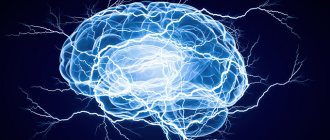Persecution mania (in one word, paranoia, scientifically correctly called persecutory delusion of persecution) is an acute mental disorder in which the patient experiences the conviction that a certain person or group of people wants to harm his health or take his life.
Most often, most paranoid people consider their relatives, neighbors, work colleagues, secret organizations, and aliens to be pests.
A person with persecution mania becomes withdrawn, suspicious, overly anxious, and unable to adequately assess himself and the environment.
Patients with this type of mental disorder can contact law enforcement agencies in order to warn about their fears, concerns, anxieties and save their lives. Most often, anxiety is excessive and not supported by objective data.
However, there are cases when a person was actually monitored. One striking example is the American writer Ernest Hemingway, who was actually monitored by American intelligence agencies. Therefore, it is necessary to carefully verify all reports of surveillance.
Persecutory delusions are one of the most common forms of mental disorders. Psychiatrist Vladimir Bekhterev diagnosed Joseph Stalin with a severe form of paranoia, talking about the spread of persecution mania among people in power.
Life without panic attacks and VSD. 5 tips for prevention
Alas, medicine does not know exactly why panic attacks occur, so the ways to combat them are rather general recommendations, which, however, will help you avoid attacks in the future.
- Don't lead a sedentary lifestyle. There is a scientific assumption that the occurrence of attacks is associated with a lack of endorphins, which our body produces during physical activity. Therefore, even light aerobic training and walking can make your life much easier.
- Try not to be nervous. Yes, we know that this recommendation sounds ridiculous - how can you not be nervous when life is so difficult? But, alas, calmness and only calmness will save you from panic attacks and other ailments.
- Don't drink coffee or reduce your intake. Caffeine in large quantities causes a rapid heartbeat and can trigger a panic attack at the most unexpected moment.
- Be careful with alcohol. Alcoholic drinks, like any pathogen, can cause unexpected reactions in the body, including causing an attack.
- Also be careful with medications. Analyze whether a panic attack is associated with taking a new drug? Sometimes medications can trigger panic attacks, so check with your doctor.
Symptoms and signs
The main sign of paranoia is a person’s fixation on an idea that becomes especially significant for the patient.
The condition is accompanied by selfishness, unjustifiably high self-esteem, and self-satisfaction.
A paranoid person ignores the positive aspects of life, but at the same time directs all his attention to sources of negative emotions, especially if they are related to the sphere of interpersonal relationships
A person suffering from paranoia does not consider the interlocutor as an individual.
He gives him an assessment based on how his opponent treats him (the paranoid person).
An individual with the disorder cannot adequately assess his skills and abilities, overestimates them and overestimates his own merits.
The first “bells” of paranoia are low mental and physical activity, passive aggression, a negative attitude towards others without objective reasons; a person’s perception of the world changes (both in terms of emotions and in terms of the functioning of the senses).
As the disorder progresses, symptoms become more pronounced:
- auditory and visual hallucinations;
- delusions and obsessions;
- decreased mental activity;
- inability to critically evaluate one's own personality;
- confidence in one’s own importance and superiority over others;
- touchiness;
- jealousy;
- suspicion;
- the tendency to look for hidden motives in everything.
Learn to love yourself
“Love yourself, and those around you will love you,” as popular wisdom says. This factor is also key in the ability to trust other people. If you are insecure, have low self-esteem, or believe that you don't deserve to be treated well, those insecurities will carry over into the relationship. However, one should not confuse adequate love for one’s own person and selfishness. In order to learn to treat yourself correctly, repeat positive mantras every time self-flagellation appears.
Found a violation? Report content
Symptoms of paranoia
The concept of paranoia refers to a spectrum of interrelated and overlapping psychopathological disorders. The concept of paranoid is also not entirely correctly applied to a group of such phenomena as a passionate, unbridled desire for a social goal in otherwise apparently normal individuals.
Although such passion can be productive and disappear with the achievement of results, it is sometimes difficult to distinguish it from pathological fanaticism. At the other end of the spectrum is paranoid schizophrenia.
A paranoid character or paranoid personality is characterized by rigidity, persistence, and maladaptive patterns of perception, communication, and thinking. Traits such as excessive sensitivity to slights and insults, suspicion, mistrust, pathological jealousy and vindictiveness are common.
In addition, persons with this diagnosis seem aloof, cold, and without a sense of humor. They can work very well alone, but usually have problems with authority and are jealous of their independence. They have a good sense of the motives of others and the structure of the group. The paranoid character differs from paranoia and paranoid schizophrenia in patterns of thinking and behavior, the relative preservation of the reality check function, as well as the absence of hallucinations and systematized delusions.
Paranoia is a psychotic syndrome that usually occurs in adulthood. Feelings of jealousy, litigiousness, ideas of persecution, invention, poisoning, etc. are often observed. Such people believe that random events have something to do with them (the concept of centrality). The person may suffer from generalized delusional or limited ideas—for example, that someone is out to harm him or that someone is having an affair with his wife. Such ideas cannot be corrected by reality testing.
Conduct problems may affect only one area, such as work or family. Paranoia often develops based on a paranoid character. Patients with paranoid schizophrenia exhibit significant disorders in relation to the outside world, based on violations of the constancy of the Self and objects, insufficient organization of mental representatives (identity) and damage to such functions of the ego and superego as thinking, judgment and reality testing. All forms of schizophrenia include psychotic symptoms.
The prodromal phase of schizophrenia is characterized by the patient withdrawing into himself, after which an acute phase occurs, accompanied by delusions, hallucinations, impaired thinking (loosening of associative connections) and disorganization of behavior.
Following the acute phase, a residual phase may occur, in which the symptoms weaken, but affective flatness and social maladaptation remain. As with paranoia, persons with premorbid schizoid or paranoid personality disorders, under the influence of intense stress and as a result of decompensation, regress into acute psychosis. This course of schizophrenia corresponds to Freud's ideas about the phases of care and restitution in psychosis.
The paranoid form of schizophrenia is characterized by hallucinations and delusions of persecution, grandeur, jealousy, and hypochondriacal delusions. Depression, diffuse irritability and sometimes aggressiveness may be accompanied by delusions of influence (the patient’s belief that his thoughts are controlled from the outside or that he himself is capable of controlling others). The rigidity of a paranoid character may mask significant disorganization.
The general functioning of the individual in paranoid schizophrenia is less impaired than in other forms; the affective flatness is not so pronounced, and the patient is sometimes able to work. Although Freud sometimes used the concepts of paranoia and paranoid schizophrenia interchangeably, he nevertheless distinguished these forms on the basis of:
1) specific psychodynamic conflict associated with repressed homosexual desires;
2) the tendency of the ego to regression and activation of paranoid defenses.
Kinds
The classification accepted by scientists includes several types of paranoia:
- Alcoholic . Delusional psychosis appears as a result of an advanced form of alcoholism. Most often, the patient suffers from delusions of jealousy or persecution.
- Paranoia of the fight . This term is somewhat outdated, but is still used in medicine. He describes a state in which a person with a disorder is focused on protecting his “infringed rights” and actively advocates for the restoration of justice. At the same time, the person is active and fanatical.
- Paranoia of desire . Delirium with amorous or erotic overtones.
- Involutionary .
Systematized nonsense, from the outside looking like a chain of events/observations/beliefs that complement each other and flow from each other. A sick person skillfully uses any factual information, interpreting it in such a way that it fits into the concept of the existing legend. - Hypochondriacal. Systematized delusion that begins with delusional interpretations and unfolds (intensifies) over time.
- Spicy . Delirium accompanied by hallucinations and stuporous symptoms.
- Acute-expansive . With this type of disorder, ideas of one’s own greatness, exclusivity and power dominate.
- Persecute . The patient's belief that he is being persecuted.
- Sensitive . A person suffering from the disorder becomes very vulnerable, touchy and sensitive, which forms the basis for conflicts.
- Paranoia of conscience . Tendency to self-accusation and suspecting oneself of something bad.
- Suggestive . A person falls into a state close to hypnotic when interacting with a pleasant/desired object.
- Litigative . Paranoia of struggle, in which a person is prone to arguing and defending his interests at any cost.
- Chronic . Develops in adulthood and old age (from 45 to 60 years).
Causes
The causes of paranoia, and many other mental disorders, have not been thoroughly studied, and therefore it is not always possible to say exactly what exactly led to the emergence of paranoia in a particular case. We can only list the reasons that can contribute to the appearance and development of this disease:
- Head injuries;
- Hereditary tendency;
- Pathological conditions in the brain;
- Drug or alcohol addiction;
- Frequent stressful situations;
- Social isolation;
- Disruption of metabolic processes associated with the process of protein synthesis;
- Age-related changes in the brain;
- Psychological trauma received in childhood;
- Long-term use of medications;
- Some chronic diseases;
- Previous brain diseases;
- Dissatisfaction with life.
Speaking about the causes of paranoia, it makes sense to identify groups of people who are more prone to developing this disease:
- Genetically predisposed people;
- People with drug or alcohol addiction;
- Elderly people;
- Men over twenty years old;
- People who are initially prone to depression or other mental disorders.
Can paranoia be cured?
At the first therapeutic stage, the doctor does everything possible to establish contact with the patient
It is important to eliminate mistrust and understand that all problems arise due to disorders and illness
When people face a cold, they immediately take medicine to get rid of runny nose and cough. So during paranoia, to get rid of the symptoms, you should help the nervous system come to its senses with the help of medications.
What to do to treat the disease? It is very important to combine the two methods. We are talking about medication correction and psychotherapy
Together they guarantee stable remission and normalize the patient’s life.
The doctor may prescribe drugs of different groups according to type:
- Neuroleptics. Aimed at eliminating thinking disorders and defocusing a person’s attention.
- Antidepressants. Normalization of mood occurs if symptoms of depression are expressed.
- Tranquilizers - quickly eliminates fear and anxiety.
- Sedatives. It calms a person down and is used to relieve insomnia.
The doctor prescribes injection forms and tablets for the disease on an individual basis, taking into account the severity of the patient, his age, the presence of health problems, and so on. In the first few sessions, the results will be consolidated and then you will be able to apply the skills yourself. In a difficult situation, he will always calm down and begin to act judiciously, and not under emotional influence.
Despite the tendency of paranoia to require protracted and long-term therapy, the disorder must be fought and can be managed. Thanks to correct and competent therapy, it will be possible to achieve stable remission and normalize the patient’s life.
Thus, paranoia is a mental disorder during which one idea can completely subjugate a person's consciousness and prevent him from thinking about anything else. Thoughts associated with jealousy, persecution, poisoning are observed. Such people often complain about everyone or sue.
Put your worries on paper
Here is a technique that people use in therapeutic courses. Write down problems and possible fears in a negative thinking journal. Allow yourself just 20 minutes of pure time a day to worry about your spouse's infidelity. Negative journal entries like these can help reduce your anxiety. Remember to balance these 20 minutes with positive actions, such as positive affirmations.
Elegant shoes 2021: the hottest trends
Tiny antibodies from alpacas and camels may help fight COVID-19
Three options: tender pancakes made from pork, chicken or beef liver
Treatment
Paranoia is characterized as a disease of the human psyche. It can manifest itself in various forms and stages: initial and severe.
With a mild form of the disorder, a person has difficulty communicating with other people, and a mild form of mistrust and isolation appears.
Treatment has its own difficulties:
- The patient may show distrust, and it becomes more difficult to establish contact.
- Refuses to admit that he is sick. In this case, what the doctor must initially do is establish contact with the person. This is not easy and may take a lot of time, but it is necessary to begin effective treatment.
It is important to diagnose the disease in time. With timely assistance, the patient learns to control his emotions, and all other symptoms, and can suppress attacks of aggression
For paranoia, different types of therapy are carried out. One of the most effective is cognitive behavioral. It works as follows - a person will be able to change his behavior pattern at the right time in order to prevent relapse.
If contacting a doctor is late, you should act more quickly.
How to behave to others?
First of all, it is necessary to help a sick person understand his problem and convince him to see a psychotherapist. It is very important to find a specialist who will find an approach to such a patient. The success of treatment and the emotional state of the patient largely depend on the level of trust in psychotherapists and psychiatrists.
You should also monitor the intake and dosage of medications prescribed by your doctor.
It is necessary to be patient and try to provide a favorable psycho-emotional atmosphere. There is no need to show excessive anxiety and negative reactions; all these actions encourage retaliatory attacks of aggression.
Relatives of a patient diagnosed with persecution mania should put themselves in the patient’s shoes, so if a person believes that some secret organization wants to kill him, then there is no need to convince him of the opposite.
How does it manifest itself in men and women?
Most often, men suffer from paranoia. But there are no fundamental differences between female and male disorders.
The course of the disease depends on the type of disorder, its form and degree. Human behavior changes gradually. It becomes difficult for him to establish contacts with others.
Conflict situations occur more and more often, and the patient himself becomes more and more closed.
He tries to “catch” his interlocutor on something, convict him and declassify him, clinging to individual words and phrases taken out of context.
At the same time, the patient’s self-esteem and self-esteem grow. A person is confident in his own importance and the indisputability of his authority. Other people seem unworthy in his eyes.
As a result, a person is not able to engage in dialogue, listen to someone else’s point of view and agree with people. Any objections provoke aggression.
An individual suffering from paranoia is not able to evaluate other people's actions in a positive way; he cannot praise another person or note his merits.
Release your guard
Paranoid people prefer to keep their ears open; they believe that other people are constantly trying to humiliate them, hurt them, harm them in some way, or threaten them. As a rule, they have unfounded beliefs and habits. However, feelings of guilt or mistrust interfere with the ability to form close relationships. Try not to look for only flaws in other people, try not to think about worst-case scenarios every second. Notice the positive traits in others.
Treatment
The main condition for proper treatment of paranoia is taking medications.
In medicine, paranoia is not classified as psychosis, but a patient with paranoia has certain difficulties interacting with other people, which can cause a lot of inconvenience to both those around him and the patient himself. If a patient is diagnosed with paranoia, doctors prescribe him treatment, which consists of undergoing a course of psychological correction.
A complicating factor in the treatment of paranoia is that the patient may experience distrust of everyone around him, including doctors. Or, due to criticality towards the entire world around him, the patient may refuse to admit the fact that he has a disease such as paranoia.
Therefore, the main task for a doctor is to establish good and trusting contact with the patient. As a rule, this is difficult to do, and it may take a lot of time for the doctor to win over the patient and begin to effectively fight the disease.
Thanks to psychotherapy, the patient begins to control the symptoms of the disease, feels the approach of an exacerbation and takes certain actions to alleviate or prevent it. There are several types of therapy that can help cope with paranoia. For example, thanks to cognitive behavioral therapy, the patient will be able to change his behavior pattern at the right time in order to prevent relapse.
As for the question - “how is paranoia treated?”, then everything is quite twofold - some patients who have just begun to show some symptoms of paranoia cope with this problem forever. But there are also a large number of patients in whom attacks of paranoia alternate with a certain remission. As already mentioned, a lot depends on at what stage of development of paranoia this disease was discovered. Due to an overly critical perception of the surrounding world, the patient himself may not notice the manifestations of paranoia, even with its strong development. For this reason, many patients end up seeing a doctor at a time when the disease has already reached a strong stage of development, and in this case it will be much more difficult to help the patient. In addition, the doctor knows well how paranoia differs from schizophrenia, and is able to help the patient detect this more dangerous disease at an early stage.
As a rule, the doctor draws up a complex that includes the following treatment methods:
- Taking neuroleptics, antipsychotropic drugs;
- Taking sedatives;
- Family psychotherapy;
- Tranquilizers;
- Individual psychotherapy;
- Antidepressants;
- Psychotherapy, which includes the use of cognitive behavioral methods.
How to treat?
What pills and medications should I take? Prescribing medications is an integral part of corrective measures in the treatment of paranoia. The doctor may prescribe to the patient:
- antidepressants;
- sedatives;
- tranquilizers;
- neuroleptics;
- antipsychotropic drugs.
The most popular in the group of antipsychotics are Propazin, Aminazine, Rispolept and Tizercin.
Patients with increased levels of anxiety may be prescribed sedatives and anticonvulsants .
Identifying the paranoid
To begin with, let’s look at the descriptions mentioned at the beginning of the article and determine the characteristic features that are associated with the behavioral characteristics of a paranoid person:
1. Distrustful and suspects everyone unnecessarily.
2. He is moralizing and constantly condemns you.
3. Doubts the ideas of others, including yours, loved ones and colleagues.
4. Cautious, secretive, cunning, cunning and/or thinks that everyone around him is the same.
5. Unshakable in his thoughts and ideas, stubbornly clings to his beliefs.
6. Touchy and vindictive.
7. Chronic complainer - always dissatisfied and expects meanness and dirty tricks in any matter.
8. I am sure that all failures in work, life or relationships are the fault of others.
9. Total control over your partner and strict routine.
10. Never seems happy - constantly on edge, anxious and irritable.
11. Constantly looking for evidence that a partner will disappoint him or take advantage of him.
12. Tries to impress upon his partner his obsession as being very important for both.
13. Doubts your loyalty and truthfulness, constantly sees some kind of “hidden meaning”.
14. Becomes suspicious when you communicate with neighbors, on the phone or on the Internet.
15. Sees an impending threat where you do not see it and insists that you are looking at the situation wrong.
16. Through the efforts of your partner, you see less and less of your old friends and family members.
17. You should always explain in detail what you did when you were away from him.
18. Gets seriously offended when he is not a part of your conversation with someone.
19. Humiliates you by getting personal, calling you naive and inexperienced. His knowledge is always perfect.
20. In this relationship, you become less sociable, increasingly nervous and worried about how your partner will react to you.
It's okay to be suspicious from time to time. And you don't need a degree in psychology to understand that there are problems in which people may exhibit ten or more of these traits. However, the partner’s high degree of anxiety, as well as mistrust, combined with unshakable beliefs, make him dangerous to others. Paranoids are often devoid of tenderness and lack a sense of humor - everything is harsh and serious.
These character traits of your partner will in no way add brightness, romance or happiness to your relationship in general. You will be subject to suspiciousness, mistrust, constant questioning, a detached lifestyle, with growing anxiety, which will gradually and insidiously reduce your happiness to nothing.
If you are in a relationship with a person who falls into all of the above, then you should understand that your partner needs the help of a professional in the field of psychology.
All of the above is designed to help you be more focused and focus on your partner's behavior before it's too late. After all, no matter what relationship you are in, you do not have to be a “victim” and endure all this
Just be careful!
[edit] Symptoms
| @lsd: Here one friend asked an interesting question: 'Talking to a cat is paranoia or not quite yet?'. @masai: This is not paranoia. Paranoia is when you are afraid to blurt out too much in front of the cat. |
| — |
SUDDENLY, there are a lot of thoughts in your head, thousands of them, forming an overvalued/delusional idea. All events are perceived by the patient as directed towards him, filled with deep meaning and interpreted in confirmation of a highly valuable idea, while those that contradict it are ignored. Actually, distrust and suspicion, as well as determination and pathological confidence in one’s rightness.
If paranoia acts as a symptom of schizophrenia, then the patient may begin to shoot at his imaginary enemies, which could be you, anon.
What is paranoia and how does it manifest itself?
There are two stages in the course of paranoia. The first stage is preparatory. There are no delusional ideas, but the person becomes very suspicious, suspicious (takes absolutely everything personally) and distrustful. A person without medical education will not be able to discern the disease at this moment.
The second stage is delusional and can last a long time. A paranoid person's character changes, delusional ideas arise and become stronger, the person becomes embittered and aggressive towards the world.
Important
Excessive suspicion, suspiciousness, and mistrust that appear suddenly can be symptoms of a mental disorder—paranoia.
In the classical concept, paranoia is a delusion of persecution (the outdated “persecution mania” is common in everyday life). Paranoia in this case is manifested by unhealthy suspicion, constant “identification” of conspiracies against oneself or loved ones, while fully maintaining the adequacy of thinking in other areas - a person can easily cope with work and study if he can be distracted by them.
There are other, less common forms of the disease:
- involutional - develops in people aged 45–60 years, characterized by “small-scale” delusions (for example, a person believes that relatives or neighbors are stealing food from his refrigerator);
- delusions of grandeur - a person is convinced of his exclusivity and uniqueness, considers himself an unsurpassed genius at work or, for example, a relative of a famous politician or artist;
- pathological jealousy - absolute conviction of a spouse’s infidelity for no apparent reason;
- erotomania - delusion is of an erotic nature - a person considers himself extremely attractive, chooses an unfamiliar (or unfamiliar) person as an object of courtship and is sure that he reciprocates his feelings, he is simply embarrassed;
- hypochondria - a person considers himself terminally ill, finds symptoms of fatal diseases;
- conscientious - a person is prone to self-flagellation, he has low self-esteem, in all difficult life situations he blames himself;
- mixed - a combination of several forms of paranoia.
Diagnosis of paranoia is carried out by a psychiatrist. From a conversation with the patient and relatives, he carefully collects an anamnesis (history of life and illness), identifies a delusional idea that led to the development of paranoia syndrome. Detailed questioning allows you to quickly make a differential diagnosis and make a diagnosis, which means that the person will get better sooner. Learn more about diagnosing paranoia.
For all forms there are common symptoms that make it possible to diagnose paranoia:
Hostile attitude towards others. Constant delusional ideas on which a person’s entire attention is concentrated. Lack of coherent thoughts. Construction of complex logical chains from delusional ideas. Absolute unwillingness to accept criticism. Reduced criticism of one’s own condition - patients consider themselves absolutely healthy, and everyone around them, on the contrary, is sick or stupid.
Paranoia shares similarities with schizophrenia. The difference will be signs characteristic of schizophrenia and completely absent in paranoia: apathy, decreased will, the presence of hallucinations. Learn more about diagnosing paranoia.
What to do if you are paranoid? How to stop being paranoid?
We will give you some tips and exercises to cope with paranoia and anxiety.
Keep a diary
Perhaps a diary will help you, in which you write, for example:
- What are your obsessive, paranoid thoughts?
- How does this make you feel?
- What is the frequency of these thoughts
- How do you sleep
- Other life situations
You can keep a notebook for this or use online applications. You can also rank thoughts on a scale of 1 to 10 depending on the degree of discomfort they cause you.
You may also find it useful:
- Determine what “turns on” paranoia and when and under what circumstances these thoughts are most likely to appear.
- Recognize paranoid thoughts when they occur and challenge them. To do this, the technique of cognitive restructuring is used.
- Think about what has helped you in the past.
Argue with your thoughts
Ask yourself how justified your thoughts are.
- Will other people think my suspicions are realistic?
- What will my friends say?
- Is it possible that I exaggerated the threat?
- Is there indisputable proof of the veracity of my suspicions?
- Is there a different way to look at situations that make me anxious?
- Is there evidence to refute my thoughts?
- Do I continue to suspect, even if other people convince me, that there is no reason for this?
Your thoughts don't reflect reality
Very often we become so immersed in our thoughts that we identify ourselves with them and believe ourselves 100%. Our brain is constantly working, it creates and develops thoughts that often have no basis. Sometimes these thoughts can be completely crazy, and sometimes they seem quite real.
But it is very important to learn to question them. Mindfulness meditation can help you with this
Our thoughts are not a complete reflection of reality. Keep this in mind when suspicion or mistrust arises. It may help to repeat the following phrase: “My brain tells me not to trust” instead of “I don’t trust.”
Seek support from your loved ones
- Share your thoughts with someone you trust. This can help reduce stress and challenge/challenge your paranoid thoughts.
- Keep in touch with people. Connect with people around you and make time for things that bring you joy. Avoiding communication with friends and relatives, giving up favorite hobbies will increase the feeling of loneliness and isolation.
- Look for mutual support organizations. They bring together people who have had similar experiences. This will help you feel understood and not alone. You can find them online or in the area where you live.
Learn to relax
- Try mindfulness. This will help cope with mild paranoia.
- Learn to manage stress.
- Try relaxation techniques such as breathing techniques or progressive relaxation techniques.
take care of yourself
- Get enough sleep. Sleep gives you energy and allows you to cope with emotions and difficult experiences.
- Eat right. Find out which foods are good for your brain.
- Exercise. Sport has a beneficial effect not only on physical but also on mental health. How to start playing sports?
- Take up an exciting hobby: gardening, crafting or some other craft, take a walk in nature and feel connected to the world around you.
Thank you for reading this article. As always, we welcome questions and comments.
Translated from Spanish by Anna Inozemtseva
This post is also available in: Spanish
Paranoia - what is it and what are its symptoms?
Like any disease, it manifests itself differently in everyone. In most cases, paranoid people have an obsession with persecution. It seems as if someone (the police, a work colleague, a neighbor in the building) is watching him.
To this is often added the delusion of harm - a person thinks that they want to harm him (poison, kill, talk behind his back).
Since there is always a fear of persecution, the patient is in constant tension and active attention, so as not to miss warning “signs” from others. Therefore, hallucinations often occur. Typically auditory. You can hear people whispering about him through the wall and making plans.
Due to increased suspicion, hostility towards acquaintances rises. A person becomes aggressive, unfriendly, embittered towards the whole world, and anxious. Insomnia also develops: it is difficult to fall asleep, and can be undermined in the middle of the night. Characterized by frequent increases in blood pressure and sweating.
This type of paranoid person checks his partner’s phone: calls and correspondence. He can stop by work and see if his crush is there. He also firmly believes in his fantasies and can start a scandal based on an invented delusional story.
A person becomes forgetful, and when speaking, the logical connection between sentences is disrupted. Paranoia often develops as a symptom of schizophrenia or brain injury, so it is clear why the entire functioning of this organ suffers.
Social media fuels paranoia
The Internet and social media further fuel paranoia as they allow you to secretly monitor situations or suspicious activities. Any controversial post will easily lower your self-esteem and sow a seed of doubt in your soul. This innocent, friendly photo paints a picture of cheating in your mind. It affects how you feel and how you behave with your significant other. To avoid feeding paranoid thoughts, stop spending time on social media and pretending to be a private detective. This way, you stop coming up with non-existent scenarios, and ask who is this girl who constantly leaves enthusiastic comments under your chosen one’s posts.
Symptoms of Paranoid Personality Disorder
Paranoid personality disorder is characterized by a pervasive mistrust and suspicion of others, such that their motives are interpreted as malicious. It usually begins in early adulthood and occurs in a variety of contexts, as indicated by four (or more) of the following:
- Suspects without reasonable grounds that others are exploiting, harming, or deceiving him
- Preoccupied with unjustified doubts about the loyalty or reliability of friends or associates
- Does not want to trust others due to unjustified fear that the information will be used against him maliciously
- Reads hidden derogatory or threatening meanings in kind remarks or events
- Constantly feels dissatisfied (i.e., does not forgive insults, injuries, or slights)
- Perceives attacks on his or her character or reputation that are not obvious to others, and reacts quickly to anger or counterattack
- Has repeated suspicions, without justification, about the fidelity of a spouse or sexual partner
Paranoid personality disorder is usually not diagnosed when a person has already been diagnosed with another psychotic disorder, such as schizophrenia or bipolar disorder, or a depressive disorder with psychotic features.
Because personality disorders describe long-standing and persistent patterns of behavior, they are most often diagnosed in adults. They are rarely diagnosed during childhood or adolescence because the child or adolescent is in constant development, personality changes, and maturation. However, if diagnosed in a child or adolescent, signs must be present for at least 1 year.
According to the American Psychiatric Association (2013), paranoid personality disorder is more common in men than women, occurring somewhere between 2.3 and 4.4 percent in the general population.
Like most personality disorders, paranoid personality disorder tends to decrease with age, and many people experience only some of the most extreme symptoms by the time they are in their 40s or 50s.
Symptoms of paranoia can range from severe (i.e., the feeling that the guy sitting next to you is popping his gum to annoy you) to severe (i.e., the feeling that there is an alien in your head that is controlling your thoughts). People who experience paranoia may exhibit the following symptoms:
- Inability to trust others
- Being easily offended
- It's difficult to forgive others
- Intense fear of being used
- Inability to cope with criticism
- Hostile or aggressive behavior
- Not willing to compromise
- Excessive suspicion
- The world is a dangerous place in which they are under constant threat
- Belief in "conspiracy theories" that lack evidence or support
- Feeling persecuted
How to get rid of paranoia?
Modern science does not know exactly how to treat paranoia. There are proven methods, but paranoia and persecution mania or alcohol paranoia require different approaches. Self-help in this case is counterproductive. In such a state, a person cannot adequately evaluate his thoughts and actions; a professional view from the outside is necessary. Therefore, if you have symptoms of paranoia, you need to contact a specialist who will conduct an analysis and prescribe a balanced treatment.
How to deal with paranoia - advice from a psychologist
The disease can be eliminated completely after the first treatment, or it can periodically return after remission. Much depends on the detection stage; in the early stages there is a high probability of successful elimination. Paranoia is treated with psychotherapy, but medications can also be used to reduce the severity of symptoms. The results also depend on the patient himself; by establishing a trusting relationship with the doctor, success will be achieved faster.
Independent work will also be required, which psychologists strongly advise not to lose sight of:
- avoiding stress and depression;
- a critical attitude towards your ideas;
- complete rest;
- rejection of bad habits;
- regular physical activity.
Be open if repairing the relationship is your goal.
In the event that your partner has indeed had an affair and you both want to save the relationship, an open heart and an open mind are two necessary ingredients for success. Don't be afraid to seek help from a professional psychologist. Specialists have many years of experience in counseling people who find themselves in difficult life situations; they successfully help partners change their attitude towards each other (especially in the area of thoughts and feelings). Choosing reconciliation after the discovery of infidelity can be difficult, but with the help of a professional expert, you can look at the situation with new eyes.











